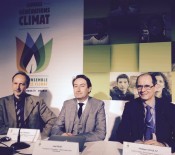At COP21, in the Climate Generations area at Le Bourget on 7 December, experts from The Bridge Tank, the Sustainable Mobility Institute and Renault discussed the issue of electric mobility in India and Brazil, along with the energy, environmental and societal issues it raises. An opportunity for Joël Ruet to unveil our think tank’s original vision of the levers to deploy this technology.
Given that transport is the world’s leading greenhouse gas emitter, just ahead of agriculture, COP21 presented the perfect opportunity to highlight innovations that are now designed and developed to create global conditions for sustainable mobility. This is a particularly salient issue in emerging countries, where population growth and aspirations to living well are spurring the development of the transport sector.
At Le Bourget, in the Climate Generations area, Renault convened experts from the Sustainable Mobility Institute, with which the Bridge Tank collaborates, to shed light on the situation in Brazil and India.
This meeting gave Joël Ruet the chance to share our new vision of electric vehicle deployment in these two emerging countries. In the case of Brazil, he laid particular emphasis on the huge potential of bio-electricity production using bagasse (sugar cane residue) to further green Brazil’s electricity mix and provide a real power generation solutions close to cities, which are the ideal places to develop electrified mobility. “Eventually, electric vehicles may provide the impetus for biomass electricity development, which could help to give Brazil a 100% renewable electricity mix,” he commented.
As for India, The Bridge Tank’s president first of all mentioned the country’s huge ambition for its energy sector, with the target of installing 100 GW of solar power by 2022 and the recent international solar alliance launched by the Prime Minister, Narendra Modi. He went on to introduce three scenarios that test the plausibility of electrified mobility in India. These are “sequencing scenarios for transformation trajectories” and constitute the core of our methodology, based on a dual approach —“bottom-up” and “top-down.”
- The ”Make in India” scenario: developing and diffusing a strategy elaborated by non-state industrial actors as part of clear state incentives to support “Make in India”
- The ”Regulatory State” scenario: implementing national plans and programs aimed at securing an energy mix that can speed up the industrial process (diversification of the energy mix, research and development on battery storage, and creation of “smart cities”)
- The ”Innovative local initiatives” scenario: setting up multiple local experiments, more specifically based on innovations by start-ups, which are able to create sustainable ecosystems and create a knock-on effect for nationwide electric vehicle deployment.
As Joël Ruet concluded: “India and Brazil have the levers to hand to deploy electrified mobility, and achieve a qualitative and ecological leap forward in their transport sectors.”

